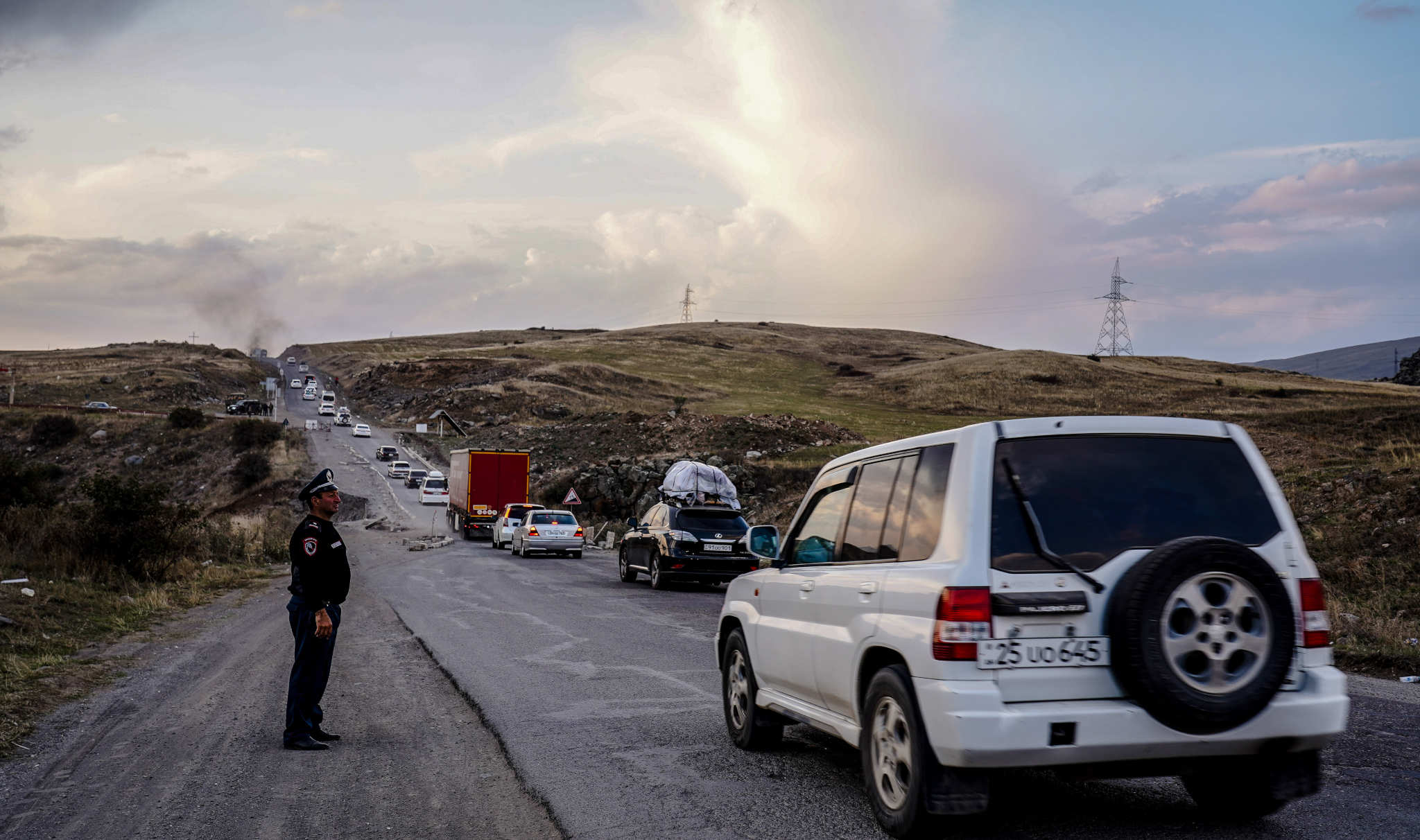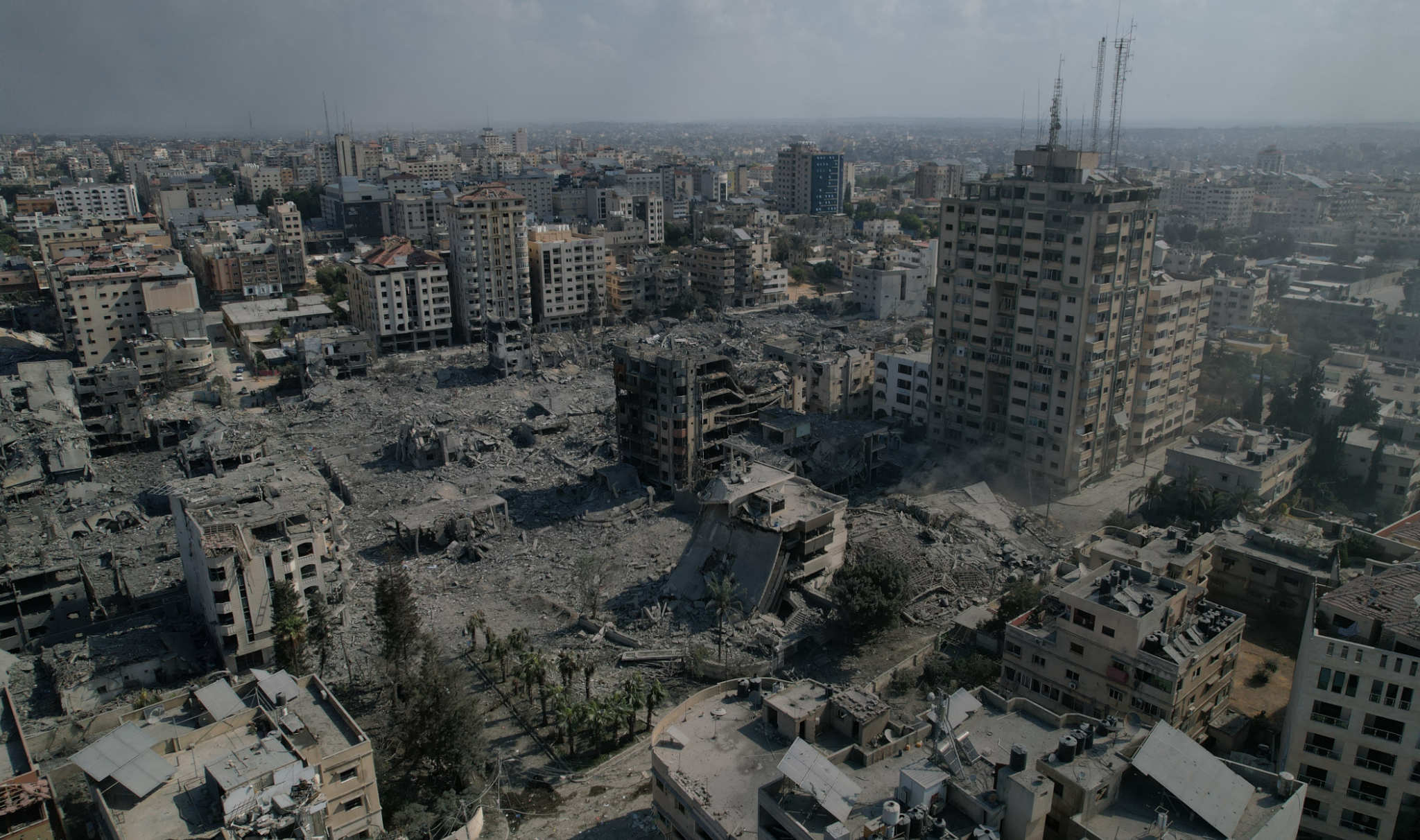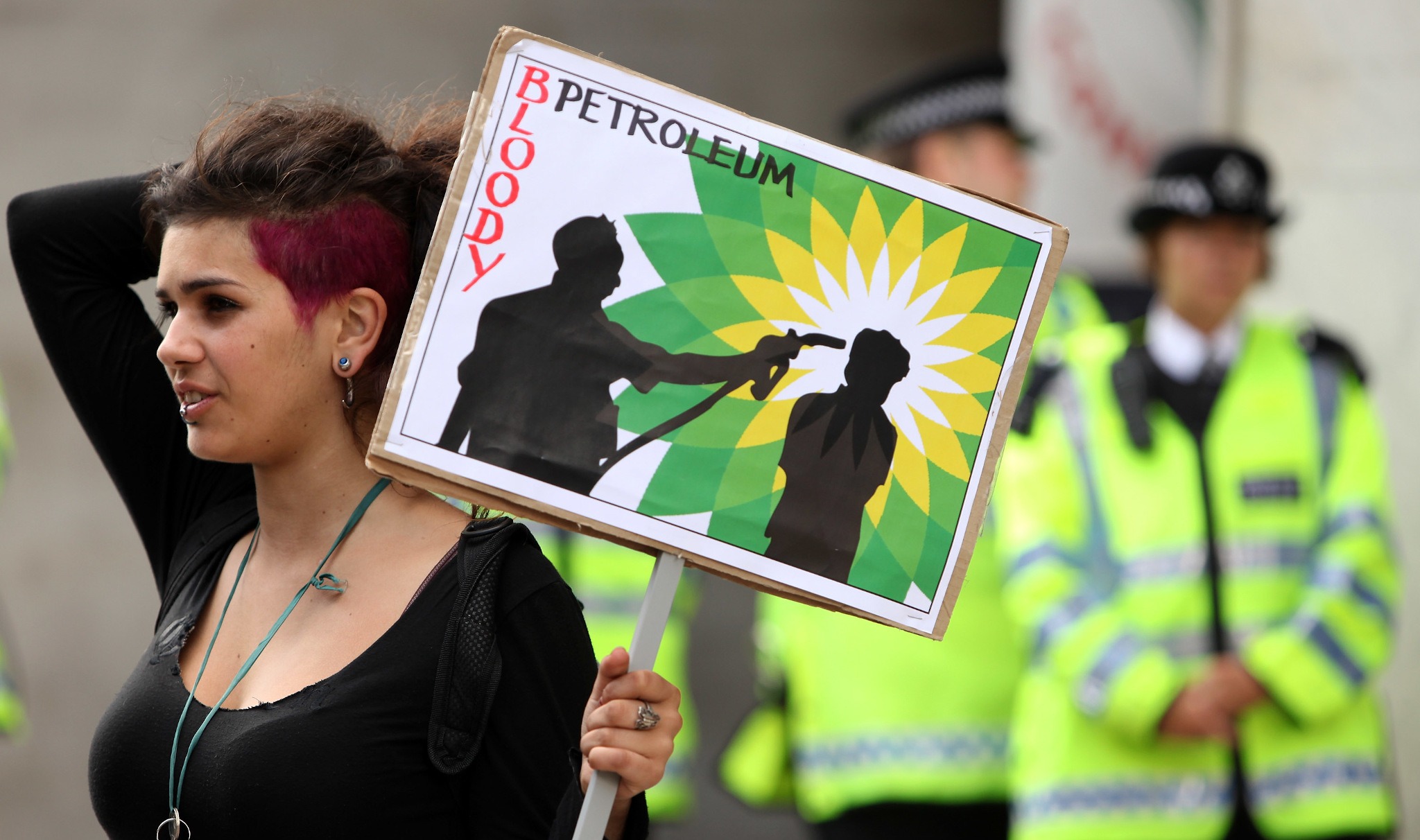On 19 September the Azerbaijani armed forces launched attacks on civilian settlements throughout Nagorno-Karabakh, a disputed territory historically predominantly populated by Armenians.
Days later, the vast majority of the enclave’s 120,000 ethnic Armenian residents fled to neighbouring Armenia.
The UK’s Foreign Office expressed deep concern over Azerbaijan’s attacks, fearing they could jeopardise the prospects of a peaceful agreement between Armenia and Azerbaijan.
It also called for restraint, a sentiment echoed by numerous European Union countries and the United States.
But the UK response is part of a long standing pattern – expressions of concern and mild calls for restraint concerning a country ruled by an authoritarian regime in which Britain has significant business interests.
The blockade
On 12 December last year, Azerbaijani protestors blocked the Lachin corridor, the only road connecting the Armenian parts of Nagorno-Karabakh to Armenia.
Soon after, volunteers from Azerbaijani government-linked youth organisations were bussed into the region and continued to block the road, claiming they were protesting against illegal mining operations on the Armenian side.
The so-called eco-protest was effectively a blockade on the population of Nagorno-Karabakh. Azerbaijan only allowed humanitarian aid deliveries from the Red Cross, which quickly created severe shortages of food, medicine, and hygiene products.
In February 2023, the International Court of Justice (ICJ) issued a ruling ordering Azerbaijan to ensure freedom of movement on the Lachin corridor. Azerbaijan ignored the ruling.
In April 2023, Azerbaijan militarised its blockade by erecting a checkpoint on the corridor. Two months later, it accused the Red Cross of smuggling “contraband” in the form of cell phones and cigarettes into Nagorno-Karabakh. Azerbaijan stopped all Red Cross aid deliveries, intensifying the humanitarian crisis.
At the UN security council meeting on the Lachin corridor issue in August, the US, France, and a number of other member countries criticised Azerbaijan for the ongoing blockade of Nagorno-Karabakh.
UK representative James Kariuki didn’t cite Azerbaijan as being responsible for the blockade, instead referring to both sides in his statement. “We strongly urge all parties to allow ICRC [Red Cross] access along all available routes,” he said.
Lack of robust response
UK Conservative MP Tim Loughton condemned what he described as the British government’s “distinct lack of robust response” to the Azerbaijani blockade of Nagorno-Karabakh.
Loughton and other British MPs previously appealed to foreign secretary James Cleverly to condemn Azerbaijan’s blockade.
In June 2023, Cleverly met Azerbaijani foreign minister Jeyhun Bayramov in London and, according to the readout of the meeting, “welcomed recent progress towards reaching a peaceful settlement to the long-standing conflict with Armenia.”
At this point, Azerbaijan’s blockade of Nagorno-Karabakh had lasted more than six months, and it had halted all food and medical aid into the enclave.
As the dust settled following Azerbaijan’s attacks on Nagorno-Karabakh, officials from the US, EU, and UK expressed surprise.
“British MPs appealed to foreign secretary James Cleverly to condemn the blockade”
On 20 September, the head of the UK’s delegation to the Organisation for Security and Co-operation in Europe, Neil Holland, noted that a day before the attacks, Azerbaijan allowed the Red Cross to deliver aid to Nagorno-Karabakh for the first time since June.
“This week began with more hopeful signals in relation to the long running tensions in this region,” he said.
EU Council president Charles Michel said he was “shocked” when Azerbaijan launched its attacks.
But a few days before the attacks, Azerbaijani forces began amassing near the borders of Armenian territory in Nagorno-Karabakh. In response, local military units on the Armenian side began to mobilise.
Azerbaijani state-run media published photos of Azerbaijanis gathering on a hillside overlooking Stepanakert, the main city in Nagorno-Karabakh, to watch the Armenians scramble. It’s hard to believe that anyone in an official regional capacity was caught off-guard by Azerbaijan’s attacks.
Previous aggression
The UK government’s failure to take a principled stance against Azerbaijan’s recent assault on Nagorno-Karabakh is part of a broader pattern.
It was initially reluctant to condemn Azerbaijan’s actions in the war it started in September 2020 against Nagorno-Karabakh and Armenia. So too did it fail to take action against subsequent attacks on Armenian territory in September of 2021 and 2022, as well as during its blockade of Nagorno-Karabakh.
Over the course of these three turbulent years, UK businesses operating in Azerbaijan, often with the assistance of UK government officials, deepened relationships with the Azerbaijani government.
The month after Azerbaijani forces launched a war on Nagorno-Karabakh and Armenia in September 2020, Azerbaijan gained control of the Zangilan district of the disputed territory.
Then, on 27 October, Anglo Asian Mining PLC, a British company operating in Azerbaijan, issued a press release regarding the territorial takeover. “The Zangilan district is a mineral-rich district in the south west of Azerbaijan,” the release noted.
It added: “Under the terms of the Company’s existing Production Sharing Agreement, the Company has been granted the right to exploit Vejnaly…which, according to the Soviet Classification, contains 6.5 tonnes of gold and 2.3 tonnes of gold.”
In response, advocacy organisation the Armenian National Committee accused Anglo Asian of “taking advantage of the war and exploiting an unstable region.”
But what initially appeared to be a private company engaging in opportunistic business practices in a conflict area grew more complicated when a report revealed that then UK ambassador to Azerbaijan James Sharp met representatives from Anglo Asian Mining during the Nagorno-Karabakh war.
Embassy officials also offered to liaise with the Azerbaijani government on behalf of Anglo Asian.
The Nagorno-Karabakh war ended in November 2020 with a Russian-brokered ceasefire agreement. The following month, in a debate in the House of Commons, UK foreign minister Wendy Morton questioned allegations made against Azerbaijan during the war, including Azerbaijan’s well-documented importation and use of Turkish-backed Syrian mercenaries and a host of war crimes Azerbaijani soldiers filmed themselves committing.
In February 2021, Morton visited Baku to discuss, among other things, prospects for the UK government and companies in the development of the territories Azerbaijan took control of in the war.
UK business
The prominent role of UK businesses in Azerbaijan dates back to the fall of the USSR, when Azerbaijan became an independent nation. British companies saw untapped potential in the oil-rich country.
A British oil trader in Baku, Azerbaijan’s capital, published a letter in the Business Post in 1995, during the tenuous ceasefire following the first war between Armenians and Azerbaijanis over Nagorno-Karabakh. He described Azerbaijan as a corrupt, lawless frontier land.
“As I sat at my desk looking up at the two soldiers with machine guns, I wondered how many managers in Britain started their day trying to save an employee’s life…This is definitely a place where who you know counts more than a superior business plan.”
“Embassy officials also offered to liaise with the Azerbaijani government on behalf of Anglo Asian.”
A 1997 piece in the Aberdeen Press and Journal written by a UK oil tradesman reads like an advertisement for foreign investment in Azerbaijan, arguing that foreign companies wouldn’t be investing in Azerbaijan if it wasn’t a stable country.
Further, the piece reasoned, if the UK didn’t get a foothold in the burgeoning Azerbaijani oil market, other countries would.
“Azerbaijan needs assistance from experienced North Sea companies today, and if we do not take up the challenge, there are hundreds of other competitors elsewhere in the world who certainly will.”
British businesses continue to play a major role in Azerbaijan today, as a paid article in the Telegraph by the UK Department for Business & Trade points out.
“With 450 UK companies already present in the market (including BP for the past three decades) the UK is the country’s largest foreign investor. But the potential for growth is evident”, it notes.
Azerbaijan the autocracy
Azerbaijan is a repressive autocracy plagued by corruption. It ranks 151 of 180 countries on Reporters Without Borders’ press freedom index, which mentions that its president Ilham Aliyev, who has been in power since 2003, “has wiped out any semblance of pluralism, and since 2014, he has sought ruthlessly to silence any remaining critics.”
Virtually all news media in Azerbaijan is controlled by the government and in 2022, Azerbaijan ranked 157 of 180 countries listed on the corruption perceptions index, which indicates extreme corruption.
On its website, the UK Department for Business & Trade highlights the pros and cons of conducting business in Azerbaijan. Chief among the cons are a lack of transparency and “inconsistent application of regulations.” Unsurprisingly, a number of UK companies have been embroiled in corruption scandals in Azerbaijan.
A 2016 Wall Street Journal report revealed bribes and other fraudulent activity related to charges billed by BP’s subcontractors on its Shah Deniz project in Azerbaijan.
Investigative group the OCCRP expanded on the initial allegations with a 2022 report showing that two Azerbaijani government-owned companies involved in phase 2 of the Shah Deniz project planned to embezzle $1.7bn. BP executives were warned, but did nothing.
“A whistleblower reported BP to the UK’s Serious Fraud Office in 2014, but the agency said it had not received enough evidence to open an investigation”, the report stated.
In 2017, the OCCRP and a number of other organisations uncovered what became known as the Azerbaijani laundromat, a scheme in which $2.9bn was laundered from Azerbaijan through shell corporations primarily based in the UK.
The funds were used to bribe European politicians in an effort to improve Azerbaijan’s international reputation. The report sparked investigations throughout Europe.
UK MP Bob Blackman, who accepted a number of free trips to Azerbaijan, lobbied on behalf of the Azerbaijani government during the 2020 war on Nagorno-Karabakh.
Blackman bragged in a podcast that “whoever gets the best propaganda tends to grab the attention of the listeners and the viewers. And in this regard I’ve been fed the information through the Azerbaijan embassy in the UK, so they’ve been very, very helpful, very, very proactive from the word go when the hostilities began.”
Territorial ambitions
Following the 2020 war, the Azerbaijani government created the “Western Azerbaijan Community,” an entity which lays claim to Armenian territory as Azerbaijan. The Community issues near-constant statements asserting its claims and publishing propaganda materials in several languages.
In December 2022, Aliyev gave a speech to Community officials. “Present-day Armenia is our land,” he exclaimed.
“I am saying this as a historical fact. We need to jointly develop the concept of returning to Western Azerbaijan. Now that the Karabakh conflict has been resolved, this is the issue on our agenda.”
And now, with control of Nagorno-Karabakh firmly secured, Azerbaijan has turned to its next geopolitical goal, the Zengezur corridor. This is a proposed land link between Azerbaijan and Nakhichivan, an Azerbaijani enclave on the western side of the Armenian border.
“‘Present-day Armenia is our land’, Aliyev exclaimed”
Azerbaijan has insisted that any peace agreement with Armenia must include stipulations on the implementation of the corridor.
On 26 September this year, as Armenians were pouring out of Nagorno-Karabakh, Aliyev and his Turkish counterpart Tayyip Erdogan held a joint press conference from Nakchivan. Erdogan said that Armenia should accept the “hand of peace” that Turkey and Azerbaijan extended to it, and stressed that Armenia must take steps to open the Zengezur corridor.
Maps published by Turkish state-run media outlets covering the press conference showed the Zengezur corridor not as a mere road, but as most of Armenia’s southern Syunik Province.
Notably, many of Azerbaijan’s attacks on Armenia following the 2020 war have been concentrated on Syunik Province. Armenian officials believe new Azerbaijani attacks on Armenia are imminent.
It’s a safe bet that the UK government’s response will be, as it has been following Azerbaijan’s previous attacks, limited to weak calls urging restraint.
Lindsey Snell is a Germany-based print and video journalist primarily covering conflict and crises in the Caucasus, Middle East and North Africa.





